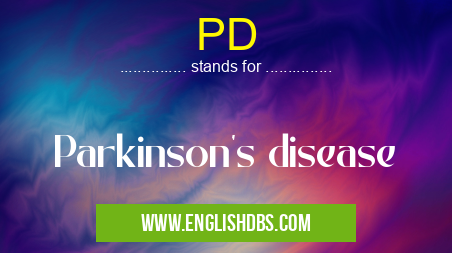What does PD mean in HOSPITALS
PD stands for Parkinson's disease, which is a long-term degenerative disorder of the central nervous system. It mainly affects the motor system, causing tremor, rigidity, postural instability and other movement-related symptoms. There is currently no cure for Parkinson's disease; however, treatment can help alleviate some of the symptoms and improve the quality of life of those affected.

PD meaning in Hospitals in Medical
PD mostly used in an acronym Hospitals in Category Medical that means Parkinson's disease
Shorthand: PD,
Full Form: Parkinson's disease
For more information of "Parkinson's disease", see the section below.
Signs & Symptoms
The most common symptom associated with PD is a tremor in one or both hands when they are resting or moving. Other signs may include slowness of movement (bradykinesia), muscular rigidity throughout the body, lack of facial expression (hypomimia), difficulty initiating voluntary movement (akinesia), impairment of posture and balance (postural instability), changes in gait or posture while walking (shuffling gait) and difficulty speaking (dysarthria). Cognitive impairment can also occur due to damage to certain areas in the brain affected by PD such as memory loss, depression, confusion and hallucinations among other behavioral changes.
Diagnosis & Treatment
Diagnosing PD involves performing a detailed physical examination to assess the presence of any motor abnormalities combined with medical history and imaging studies such as a CT scan or MRI to look for structural changes in the brain associated with this condition. Once diagnosed, treatment usually involves medications to manage symptoms along with lifestyle modifications including regular exercise, stress management techniques and improving diet habits to help manage symptoms over time. Additionally there are therapies available such as occupational therapy which can help patients learn how to effectively move their bodies despite any limitations they may be facing due to their PD diagnosis.
Essential Questions and Answers on Parkinson's disease in "MEDICAL»HOSP"
What is Parkinson's disease?
Parkinson's disease (PD) is a neurological disorder that affects the part of the brain responsible for producing dopamine, the neurochemical that regulates mobility and movement. It leads to a myriad of physical symptoms including tremors, slow movements, string muscle stiffness, instability and difficulty with walking and coordination.
Who is most at risk for developing PD?
PD most commonly affects people over 60 years old but can be found in younger adults as well. Other risk factors may include genetics, environmental toxins, head trauma or viral infection.
How is PD diagnosed?
PD diagnosis starts with gathering medical history of symptoms and performing physical tests. This evaluation is followed by laboratory tests to check blood levels or evaluate nerve conduction studies. Additionally, deep brain scans are often required to confirm diagnosis of PD.
Are there treatments available for Parkinson's disease?
Fortunately, there are many treatments available for PD that range from medication, surgical therapy and lifestyle modifications such as diet changes or exercise programs. A doctor will determine an individualized treatment plan based on the severity of symptoms and specific needs.
What lifestyle changes can I make if I have Parkinson's disease?
Making lifestyle modifications can help manage PD symptoms and improve quality of life. Eating a healthy balanced diet high in fiber and low in saturated fats alongside avoiding processed foods can help maintain good nutrition; exercising regularly can help reduce stiffness and build core strength; joining support groups to learn more about living with PD and connecting with other patients; seeking professional counseling to manage psychological stress; getting adequate sleep to improve cognitive function; limiting caffeine intake; reducing alcohol consumption; quitting smoking; and finding ways to reduce stress such as mindfulness meditation or yoga etc.
Is Parkinson’s Disease a progressive disorder?
Yes, unfortunately Parkinson’s Disease usually progresses over time meaning symptoms will worsen slowly but steadily unless treated effectively with medication or lifestyle adjustments. It is important to monitor progression closely so that interventions can be administered when needed.
Are there any secondary effects associated with taking medication for Parkinson’s Disease?
Some medications used for treating PD may have side-effects such as dizziness, involuntary movements (dyskinesia), nausea and vomiting, hallucinations or dreams etc depending on which medication you take so it is important to discuss these possibilities with your doctor beforehand in order to receive appropriate care.
Can complications occur due to having Parkinson’s Disease?
Unfortunately yes since people living with PD are also more likely than healthy individuals to develop complications like infections (urinary tract infection UTI), extreme fatigue/sleep difficulties connected with motor fluctuations because some medications taken late in the day tend to wear off overnight leading to “off periods” where motor problems return, cognitive impairment due decreased dopamine release which markedly reduces memory recall ability etc..
Final Words:
PD stands for Parkinson’s disease, a progressive neurological disorder that mainly affects motor functioning but can also cause cognitive impairments due to reduced dopamine levels in certain areas within the brain associated with this disorder. While there is no known cure at this time there are treatments available that address both motor and cognitive impairments though its best managed through a combination of lifestyle modifications along with medications prescribed by neurologists specially trained on treating this condition.
PD also stands for: |
|
| All stands for PD |
